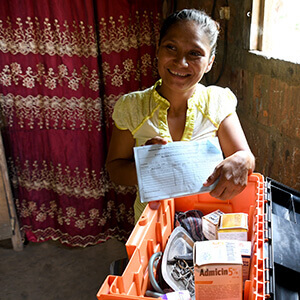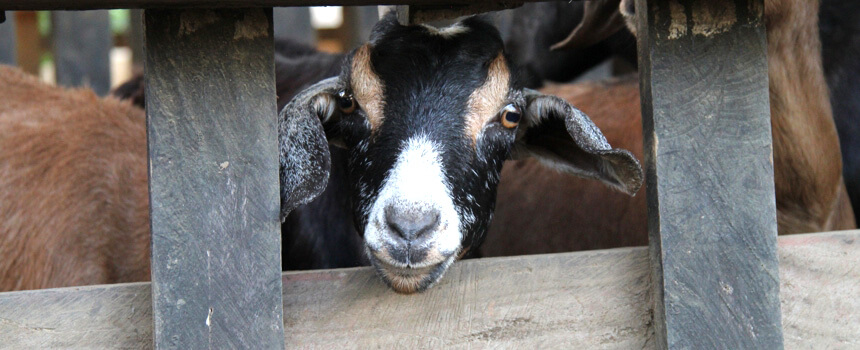 When women are strong, stomachs are full!
When women are strong, stomachs are full!
Training of veterinary specialists in Nicaragua
While in Germany we are waiting for the first snow in Advent, Nicaragua sees the beginning of the annual dry season. During that time, smallholder families in rural areas are struggling to cope with increasing water shortages. The fact that people in Nicaragua have less and less water also has something to do with us: it is a consequence of global climate change. In Nicaragua of all places – the water-richest country in Central America – people and animals are suffering more and more from food and water crises. In addition, many smallholders in Nicaragua lack knowledge about adapted cultivation methods, animal hygiene and appropriate feeding. Due to this situation and the climatic conditions, entire harvests are lost and many farm animals die an avoidable death. The 2015 drought destroyed almost 50,000 tons of maize, one million cattle suffered from malnutrition and 2,500 animals died of thirst (Zeit online, 2015). Due to this situation, many families often did not have enough to eat for themselves.
Necessity
Veterinary treatment at the local level (e.g. vaccinations for goats) for the benefit of smallholder families in remote communities in Nicaragua.
Activity
Women are trained to become veterinary specialists and are provided with medicines to provide affordable veterinary treatments.
Countable effort
Number of veterinary treatments that will be provided by local women specialists.
Result
Animal diseases are diagnosed early and can be treated inexpensively, which reduces animal mortality and helps increase livestock productivity.
Systemic effect
Improved animal welfare and food security as well as reduced gender hierarchies and a stronger position of women in the communities.
Background
The lack of water and the resulting difficult living conditions particularly affect women in rural Nicaragua. Women are often greatly dependent on their husbands. According to United Nations statistics, 23 percent of all women in Nicaragua have experienced domestic violence at least once (UN Women, 2016). Opportunities for self-realisation are therefore limited. Added to this are the ongoing political unrest and anti-government protests, which began in April 2018. More than 500 people are said to have died in the protests (Frankfurter Allgemeine Zeitung, 2018). The country is in a deep social crisis and thousands of people have already fled to neighbouring Costa Rica. Small farmers live mainly by goat and sheep breeding. Nevertheless, most people have little knowledge of animal husbandry. So far, they have rarely cultivated their own feed, which could be used during the dry season. Animal mortality from births and diseases is high. State or private veterinary services are not available in the communities, so there is no possibility to treat the animals locally. In emergencies, people have to travel the long and expensive way to the district town – if they can afford it.
The good deed
Through the good deed, women in Nicaragua are trained as veterinary specialists. They acquire the knowledge and tools to be the contact persons for around 500 animal owners in their communities. The new possibility of being able to provide animals with health care in their own communities reduces animal mortality and increases milk and meat yields. The good deed thus improves the nutritional situation of the families. Furthermore, women are advancing into areas traditionally dominated by men and their social standing and self-confidence are growing enormously. "In the past, I hardly dared even to speak up. Thanks to the work of the Xochilt Acalt women's centre, I now know what I am capable of. I use my skills to help many people in my community when their animals are sick," says Mirna R., an animal health specialist trained in a previous project. The good deed is therefore also an important contribution to strengthening women’s rights and the position of women in Nicaragua.

AboutNicaragua
Managua
6 150 000
5.157
124
Lake Nicaragua is the largest lake in Central America – but water is still scarce. According to Germanwatch’s 2018 Climate Risk Index, Nicaragua is fourth among the countries of the world when it comes to being threatened by climate change (Germanwatch, 2018).
About the organization and further information
Inkota-netzwerk e.V.
Website
Further information and source
- Zeit Online, 2015. Zentralamerika: El Niño treibt Millionen Menschen in den Hunger.
- Welt, 2014. Mittelamerika ächzt unter einer schweren Dürre.
- UN Women, 2016. Global Database on Violence against Women.
- Frankfurter Allgemeine Zeitung, 2018. Nicaragua. Schon mehr als 500 Tote seit Beginn der Proteste.
- Nicaragua-Forum Heidelberg, 2015. Nicaragua betroffen von Dürre und Klimawandel.
- Germanwatch, 2018. Globaler Klima-Risiko-Index 2018.
- Germanwatch, 2018. Globaler Klima-Risiko-Index 2018.
- Nicaragua-Forum Heidelberg, 2015. Nicaragua betroffen von Dürre und Klimawandel.
- Frankfurter Allgemeine Zeitung, 2018. Nicaragua. Schon mehr als 500 Tote seit Beginn der Proteste.
- UN Women, 2016. Global Database on Violence against Women.
- Welt, 2014. Mittelamerika ächzt unter einer schweren Dürre.
- Zeit Online, 2015. Zentralamerika: El Niño treibt Millionen Menschen in den Hunger.




